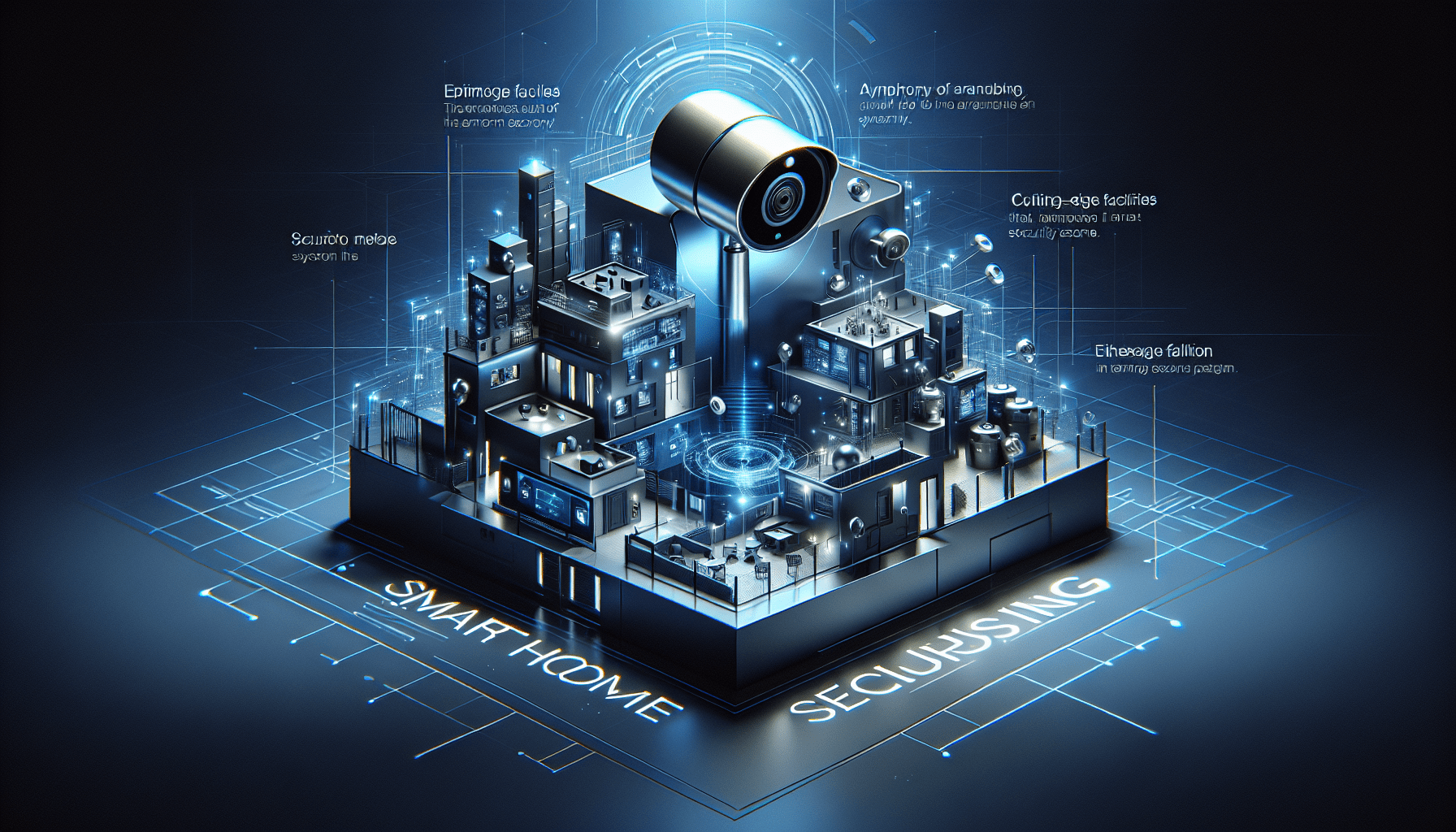Imagine a world where you don’t have to worry about the reliability of your internet connection for your smart home security system. No more concerns about power outages or connectivity issues affecting the safety of your home. Is it possible for smart home security systems to function seamlessly without an internet connection? In this article, we explore the potential of smart home security systems operating independently, offering you peace of mind and an enhanced level of security for your home.
Overview of Smart Home Security Systems
Smart home security systems refer to a network of smart devices that are installed in your home to enhance security and provide peace of mind. These systems use technology and connectivity to allow remote access and control, real-time alerts and notifications, and monitoring of your home from anywhere in the world. They are designed to provide comprehensive protection against burglary, fire, and other emergencies, and are becoming increasingly popular among homeowners.
Definition of Smart Home Security Systems
Smart home security systems are a collection of devices, sensors, and cameras that work together to monitor and protect your home. These systems are connected to the internet, enabling them to provide remote access and control. They often include features like motion detectors, door and window sensors, surveillance cameras, and alarm systems. These devices can be easily installed and integrated into your existing home network, allowing you to monitor and control them using a smartphone or computer.
Components of Smart Home Security Systems
Smart home security systems consist of several key components that work together to provide comprehensive protection. These components include:
- Control panel: This serves as the central hub of the system and allows you to arm and disarm the security system, control connected devices, and receive notifications.
- Sensors: Sensors are placed on doors, windows, and other entry points to detect any unauthorized access. They trigger an alarm when someone tries to break in.
- Surveillance cameras: These cameras capture live video footage of your home and can be accessed remotely to monitor activities in and around your property.
- Motion detectors: These devices detect motion in specific areas of your home and trigger the alarm if an intruder is detected.
- Alarm system: The alarm system alerts you and the monitoring company if a security breach is detected. It may include audible alarms, flashing lights, and notifications.
- Mobile app: The mobile app allows you to remotely control and monitor your security system from anywhere in the world using your smartphone or tablet.
Importance of Internet Connection in Smart Home Security Systems
The internet plays a crucial role in the functionality of smart home security systems. Here are two key reasons why an internet connection is important:
Remote Access and Control
An internet connection enables you to remotely access and control your smart home security system. Whether you’re at work or on vacation, you can use your smartphone or computer to arm or disarm the system, monitor live video feeds, and receive notifications about any security events. This remote access and control give you the flexibility and convenience to manage your security system from anywhere, providing peace of mind and ensuring the safety of your home and loved ones.
Real-time Alerts and Notifications
With an internet connection, your smart home security system can send real-time alerts and notifications to your smartphone or computer. This means that you’ll be instantly alerted if there’s a security breach, such as a break-in or fire, allowing you to take immediate action. These alerts can be in the form of push notifications, emails, or SMS messages, ensuring that you’re always aware of what’s happening in and around your home.
Challenges of Smart Home Security Systems without Internet
While an internet connection provides numerous benefits to smart home security systems, there are some challenges to consider when operating these systems without internet connectivity:
Limited Functionality
Without an internet connection, the functionality of your smart home security system may be limited. You won’t be able to remotely access and control the system from outside your home, which means you’ll have to physically interact with the control panel or use a local network connection. This can be inconvenient, especially if you’re away from home and need to arm or disarm the system remotely.
Lack of Remote Monitoring
Another challenge of operating a smart home security system without an internet connection is the lack of remote monitoring capabilities. Without internet connectivity, you won’t be able to remotely access live video feeds, receive real-time alerts, or monitor your home from anywhere in the world. This can significantly impact your ability to respond quickly to security events and may leave you feeling less secure about the protection of your home.
Alternative Methods for Smart Home Security Systems
While an internet connection is highly recommended for optimal functionality of smart home security systems, there are two alternative methods that can be considered:
Local Network-based Systems
Local network-based systems operate within your home’s local network, allowing you to access and control the security system without an internet connection. These systems use Wi-Fi or other local network protocols to communicate between devices. While they provide limited functionality compared to internet-connected systems, they still allow you to arm and disarm the system, receive notifications within your home, and monitor live video feeds. However, keep in mind that these systems may not provide remote access or monitoring capabilities while you’re away from home.
Cellular Network Connectivity
Another alternative method for smart home security systems without an internet connection is cellular network connectivity. By using a cellular network connection, the security system can communicate with your smartphone or a monitoring company through a cellular data network. This allows you to remotely access and control the system, receive real-time alerts, and monitor your home from anywhere with cellular coverage. However, it’s important to note that cellular network connectivity may come with additional costs, such as a monthly data plan or subscription fees.
Local Network-based Systems
Local network-based systems offer a viable option for smart home security systems without an internet connection. These systems are designed to operate within your home’s local network, providing limited functionality but still offering basic security features. Here is a description of local network-based systems, along with their benefits and limitations.
Description of Local Network-based Systems
Local network-based systems rely on your home’s local network, such as Wi-Fi, to communicate between devices and provide security functionalities. These systems often consist of a control panel, sensors, and cameras that are connected to your home network. You can access and control the system using a dedicated mobile app or through the control panel itself. These systems offer features like arming and disarming the system, receiving notifications within your home, and monitoring live video feeds. They do not require an internet connection for operation, making them suitable for areas with unreliable or no internet coverage.
Benefits and Limitations
Local network-based systems offer several benefits, including:
- No reliance on the internet: As these systems operate within your home’s local network, they do not require an internet connection. This means that even during internet outages or when you’re in an area with no internet coverage, you can still use the security system to protect your home.
- Increased privacy and security: By not relying on an internet connection, local network-based systems offer increased privacy and security. Since the system doesn’t communicate with external servers, there is less risk of data breaches or unauthorized access to your security system.
However, it’s important to consider the limitations of local network-based systems, including:
- Limited functionality: These systems provide limited functionality compared to internet-connected systems. You won’t have the ability to remotely access and control the system or receive real-time alerts and notifications when you’re away from home.
- Lack of remote monitoring: Without an internet connection, you won’t be able to remotely monitor your home and access live video feeds. This can be a drawback if you’re concerned about the ability to monitor your property while you’re away.
Cellular Network Connectivity
Cellular network connectivity provides another alternative method for smart home security systems without an internet connection. By using a cellular data connection, the security system can communicate with your smartphone or a monitoring company, providing remote access and control. Here is a description of cellular network connectivity, along with its benefits and limitations.
Description of Cellular Network Connectivity
Cellular network connectivity involves using a cellular data network, such as 3G or 4G, to connect your smart home security system to the internet. This allows the system to communicate with your smartphone or a monitoring company through the cellular network. The system can send real-time alerts, receive commands for arming or disarming, and provide remote access to live video feeds. This method does not rely on your home’s Wi-Fi network or an internet connection, making it suitable for areas with unstable or no internet coverage.
Benefits and Limitations
Cellular network connectivity offers several benefits, including:
- Reliability in areas with no internet coverage: If you live in an area with unreliable or no internet coverage, cellular network connectivity ensures that your smart home security system stays connected and functional. The system uses the cellular data network to communicate, providing peace of mind even in remote locations.
- Remote access and monitoring capabilities: With cellular network connectivity, you can remotely access and control your security system from anywhere with cellular coverage. This allows you to receive real-time alerts, monitor live video feeds, and arm or disarm the system while you’re away from home.
However, there are a few limitations to consider:
- Additional costs: Cellular network connectivity may come with additional costs, such as a monthly data plan for the security system or subscription fees for remote monitoring services. These costs should be factored into your decision-making process.
- Network coverage limitations: The availability and quality of cellular network coverage may vary depending on your location. Before opting for cellular network connectivity, ensure that your area has reliable cellular coverage to support the system’s functionality.
Hybrid Solutions for Smart Home Security Systems
Hybrid solutions combine the benefits of internet connectivity and local network-based systems to provide a comprehensive smart home security solution. These systems offer both internet and local network connectivity and can automatically switch between the two to ensure continuous operation. Here are two important aspects of hybrid solutions:
Combining Internet and Local Network Connectivity
Hybrid solutions for smart home security systems combine both internet connectivity and local network connectivity. This enables the system to operate seamlessly regardless of the availability of an internet connection. When an internet connection is present, the security system can use it to provide remote access, control, and monitoring capabilities. If the internet connection fails or is unavailable, the system can automatically switch to local network connectivity, ensuring that the basic security functions remain operational. This combination of connectivity options provides added flexibility and reliability to the system.
Backup Systems for Internet Failure
Hybrid solutions often incorporate backup systems to ensure continuous operation in case of internet failure. These backup systems can include options like cellular network connectivity or local storage of security data. In the event of an internet outage, the backup system kicks in, allowing you to still remotely access and monitor your security system. This backup functionality gives you peace of mind, knowing that your home is protected even when there are connectivity issues.
Considerations for Choosing a Smart Home Security System
When choosing a smart home security system, there are a few important considerations to keep in mind:
Availability of Internet Connection
Consider whether a reliable internet connection is available in your area. While local network-based systems and cellular network connectivity can work without internet, having a stable internet connection provides the most comprehensive functionality and remote access options. If you have unreliable or no internet coverage, prioritize systems that offer local network connectivity or cellular network options.
Reliability and Security
Ensure that the smart home security system you choose is reliable and secure. Look for reputable brands, read customer reviews, and consider the system’s track record in terms of performance and security. Pay attention to features like encryption, two-factor authentication, and regular software updates to ensure the highest level of protection for your home and personal data.
Conclusion
In conclusion, the internet plays a crucial role in the functionality of smart home security systems. An internet connection enables remote access and control, real-time alerts and notifications, and enhanced monitoring capabilities. While there are alternative methods for operating smart home security systems without an internet connection, such as local network-based systems and cellular network connectivity, these options may come with limitations and additional costs. Hybrid solutions that combine both internet and local network connectivity offer the most comprehensive functionality and reliability. When choosing a smart home security system, consider the availability of an internet connection, as well as the system’s reliability and security features. By carefully evaluating these factors, you can choose the right solution to protect your home and loved ones effectively.






